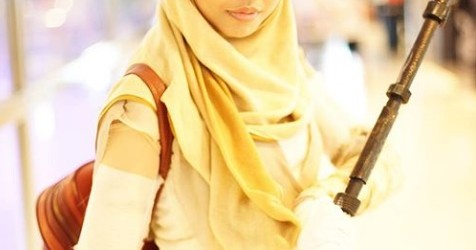I am not a Star Wars fan. I actually fell asleep marathoning the first three (Episodes IV, V and VI) with my sons. But I was excited for Star Wars: The Force Awakens. And it was for one reason; the diverse cast. A female lead! A Black StormTrooper! A Latino pilot! Yes! Sign me up. I have become increasingly tired of Hollywood’s whitewashing of movies lately. I refused to watch the latest update of Cinderella and Pan. And the trending #OscarsSoWhite is even more evidence of the trend.
Haroon Maghoul recently wrote an open letter to JJ Abrams, published in the Washington Post, imploring the director to add a Muslim character to his rebooted series “Star Trek” and “Star Wars” citing that the world needed a Muslim Jedi named Muhammed to offset Islamophobia.
And I agree that it’s time for a Muslim character. But it’s not just about Islamophobia. It’s about representation and the excitement you feel seeing someone who looks and sounds like you up on screen. When Rey (played by Daisy Ridley) first appears on screen, she is practically wearing a (kind of) hijab! I thought, ‘that could be me!’ Rey’s character is a turning point for female leads, well, white female leads, because she’s more than keeping up with the boys, she’s passing them by. She repeatedly tells Finn “not to hold her hand” while running. She’s capable of doing what she needs to without him leading her. Rey’s character is admirable for her qualities. It’s clear Finn finds her attractive and is interested in her but she isn’t sexualized. She is smart and a technical whiz kid.
Her outfit makes sense and isn’t distracting. Watching the movie with my sons, I didn’t feel embarrassed, the way I did watching Princess Leia in her infamous gold bikini in Star Wars: Return of the Jedi. Rey is everything I wish I could have had growing up. Interestingly enough, Rey is loved by boys and girls and stores can’t keep her toys stocked on the shelves even after toy manufacturers thought there wouldn’t be an interest in her.
This just goes to prove the point that audiences can surprise you sometimes. A female lead can be just as interesting as a male. Black characters can work seamlessly into the narrative. Shonda Rhimes recently stated while accepting an award that, “It’s not trailblazing to write the world as it actually is.” And the same is true for Muslims. The Ms. Marvel comic has a popular following with Muslims and non-Muslims. The key is a good story. The intention since the comic’s inception was to have her Muslim identity never be the forefront of the storyline. According to writer G. Willow Wilson, “Being a Muslim is really only one part of her overall arc, her overall journey.” Her Islamic identity is a part of her life but it isn’t all that she is. Even Muslims don’t want to watch characters doing “Muslim” things all the time. Here’s where Mr. Moghul’s point about Islamophobia comes in; because there are so many people who have never actually interacted with a Muslim, having a Muslim character in a successful franchise would be the ultimate introduction. In fact, studies have shown that audiences exposed to positive depictions of minority groups had more positive reactions toward that group. With that in mind, it may even be a matter of safety. Especially when people like Megyn Kelly ask questions during a Presidential debate about whether people should call the police on Muslims receiving packages, the world needs to see the human side of Muslims.
People want characters they can believe in and root for. When John Boyega was cast, there was a call for a boycott. But once you watch him in the film, haters (hopefully) see past the color of his skin and root for the man. For the hero. But for the little girl or boy watching, his skin color will mean something to them. It will mean they too can be the hero. Little children watching these movies will grow up thinking this is the natural landscape of things.
I am confident the same can be done for Muslims; especially when I see amazing and gorgeous images of Muslim cosplay. Muslims as a group are very diverse and to reflect that diversity we need more than one token character, as Mr. Moghul notes, but starting with one may just be the push Hollywood needs. In this article by Vox, the writer makes the argument that Hollywood is stuck in “a bubble of expanded movie universes.” We have, as an audience, accepted aliens and supernatural beings, why not a Muslim? We need to start thinking past the default white female character. We need to ask what a Muslim woman looks like on screen. Can she be like Rey or Agent Carter or Black Widow while going off to pray once in a while? Or making dua or something? At this point, I’m not even sure myself. But we won’t ever really know without asking. Every person deserves to feel represented by the media they consume. Let’s just hope Hollywood gets the memo!

